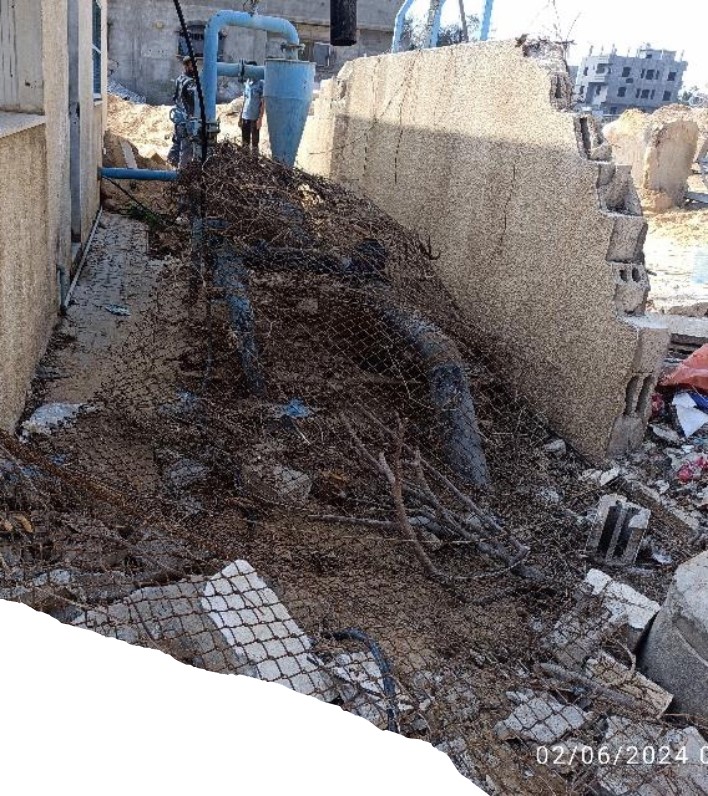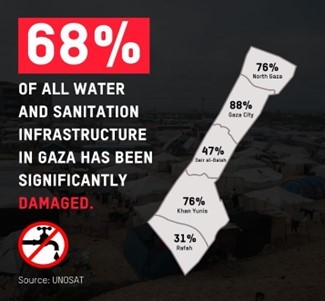Tackling Gaza’s water crisis
A cycle of perpetual conflicts, a devastating 15-month war and severe economic restrictions have created a catastrophic water crisis in the Gaza strip.
Since October 2023, tightened blockades and relentless military bombardments have further exacerbated the humanitarian crises, making safe drinking water critically scarce. Amid this dire backdrop, Muslim Hands UK, in partnership with UN agencies, has embarked on a transformative project to provide people in Gaza, most of whom are displaced and at great risk of death and disease, with access to safe, clean drinking water.

The dire water situation and urgent needs in Gaza
Gaza has long been plagued by water scarcity, but the ongoing conflict has transformed an already dire situation into a full-blown crisis. The coastal aquifer, Gaza’s primary water source, is severely depleted, with 97% of its water deemed unfit for human consumption due to salinity (high salt content), over-extraction and pollution.
Decades of political conflict and economic isolation have compounded these challenges. The Israeli blockade that has been in place since 2006 has systematically restricted the import of materials needed to repair and upgrade water infrastructure. At the same time, rapid population growth (Gaza’s population is expected to double by 2050) has placed immense pressure on limited water resources.
The war that erupted in October 2023 marked a turning point Israel imposed a complete blockade, cutting off essential supplies, including water, electricity and fuel. According to the UN WASH Cluster, 68% of Gaza’s water and sanitation infrastructure has been damaged or destroyed. This has left over one million displaced people in desperate need of clean water to survive. Overcrowded shelters, poor sanitation and limited hygiene facilities have created a breeding ground for disease, putting people in further danger.

Building a resilient water sector in Gaza
Recognising the urgency, Muslim Hands UK began a project to construct three water wells and three reverse osmosis (RO) desalination plants powered by solar energy. These interventions are not merely temporary fixes, they represent a strategic effort to build long-term resilience in Gaza’s water sector.
The initiative consists of three key components:
- Constructing three water wells: These wells are strategically placed to drill down into cleaner water layers which are less affected by salinity and pollution.
- Installing Reverse Osmosis (RO) water desalination plants: These plants ensure the extracted water is safe for drinking, cooking and hygiene purposes in line with World Health Organization standards.
- Installing solar-powered desalination plants: Solar energy is harnessed to power the desalination plants, offering a sustainable and environmentally-friendly solution. The project reduces dependence on Gaza’s unreliable electricity grid and costly diesel generators. since the solar energy, abundant in the region, offers a consistent and cost-effective power supply for water purification processes.
Community-owned, sustainable solutions
These interventions will directly benefit tens of thousands of displaced families. By providing clean water for drinking, hygiene and cooking, the project will reduce the risk of waterborne diseases like cholera and dysentery, especially in overcrowded shelters.
Local workers are being trained to manage and maintain the new facilities. This will ensure long-term sustainability and foster community ownership. The construction and maintenance of these facilities also creates employment opportunities, injecting much-needed activity into Gaza’s struggling economy.
By involving local communities in project operations, Muslim Hands UK and UN agencies are empowering Gazans to take control of their water resources, building resilience against future crises.
A solar-powered blueprint for addressing water scarcity and sustainability
- Solar-powered desalination plants reduce environmental harm and operational costs, offering a model for sustainable humanitarian interventions which aligns with the Sustainable Development Goals.
By showcasing the potential for innovative solutions in conflict zones, this project provides a blueprint for international efforts to address water scarcity. The partnership between Muslim Hands UK, UN agencies, and local communities underscores the importance of collaboration in tackling complex humanitarian challenges.
Addressing Gaza’s water crisis requires coordinated global action. Governments, international organisations and donors must prioritise sustainable solutions, invest in resilient infrastructure and advocate for the protection of civilian resources during conflicts.
The situation on the ground keeps evolving, and project implementation is being adapted in response. Site selection for water wells and desalination plants is based on ongoing assessments which consider accessibility, security and long-term viability. Given the uncertainties surrounding Gaza’s future governance and infrastructure, flexibility is key to ensuring water solutions are sustainable and can continue to serve communities effectively in the coming months and years.
As Muslim Hands UK continues to implement transformative projects, the hope for a better future in Gaza endures. These efforts not only provide immediate relief but also lay the foundation for long-term recovery, ensuring that the people of Gaza can rebuild with dignity and resilience.
Category
News & Views
